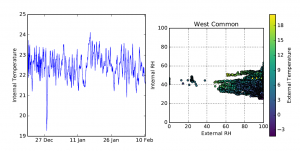By Dr Faustina Hwang, Biomedical Engineering, University of Reading
Most people know the importance of staying well hydrated on a hot sunny day. However, for vulnerable older adults, ensuring adequate fluid intake day-to-day is key to maintaining mental and physical health and lowering the risk of hospital admission.

A team from the University of Reading has been working in partnership with Perton Manor specialist care home in South Staffordshire to develop Hydration HEALTH (Hydration in Elderly Adults Linked to Temperature and Humidity), a technology-based system which aims to detect risk of dehydration and help care home staff ensure all their clients are drinking enough to stay healthy.
The Hydration HEALTH system monitors the temperature and humidity inside and outside the building as well as the client’s food and drink intake and fluid loss in order to better understand how these factors interact and affect their hydration levels.
The system was designed in collaboration with Perton Manor, and was recently trialed for a week in the specialist care home. During this pilot study, sensors were installed inside and outside the care home for continuous logging of temperature and humidity, staff used a mobile app to record clients’ food and drink intake throughout a 24-hour period, and six clients gave biological samples to be analysed for biomarkers of hydration.
The project has provided valuable insights about how to design and deploy a hydration-monitoring technology for use in a real-world setting, and has also produced a very rich dataset. This data is currently being analysed in order to characterise how well the system has worked in practice, and to investigate what features in the data would be most useful for prompting action by care staff.
Technology for health
The project has highlighted the potential benefits of the technology for supporting person-centred care of people with dementia.
Richard Hodgkisson, Nurse Manager, said “Many of our clients are no longer able to verbalise their needs or what they like and dislike. I would normally need to look across 30 days worth of paperwork to get an overview of their patterns. Having the information available on a computer makes it much easier to tailor for individual preferences.” The project team are discussing possibilities for further developing Hydration HEALTH into a system that could be used in care homes on a regular basis.
Hydration HEALTH is an interdisciplinary collaboration of researchers from the Meteorology, Biomedical Engineering, Food and Nutritional Sciences, and Typography & Graphic Communication Departments at the University of Reading, working in partnership with Perton Manor care home. We are indebted to the clients who participated in this study and their families. We also thank the care home staff for their time, participation and support. This research is supported by an EPSRC Institutional sponsorship grant to the University of Reading.

13-19 March 2017 is Nutrition and Hydration Week which ‘aims to highlight, promote and celebrate improvements in the provision of nutrition and hydration locally, nationally and globally.’
